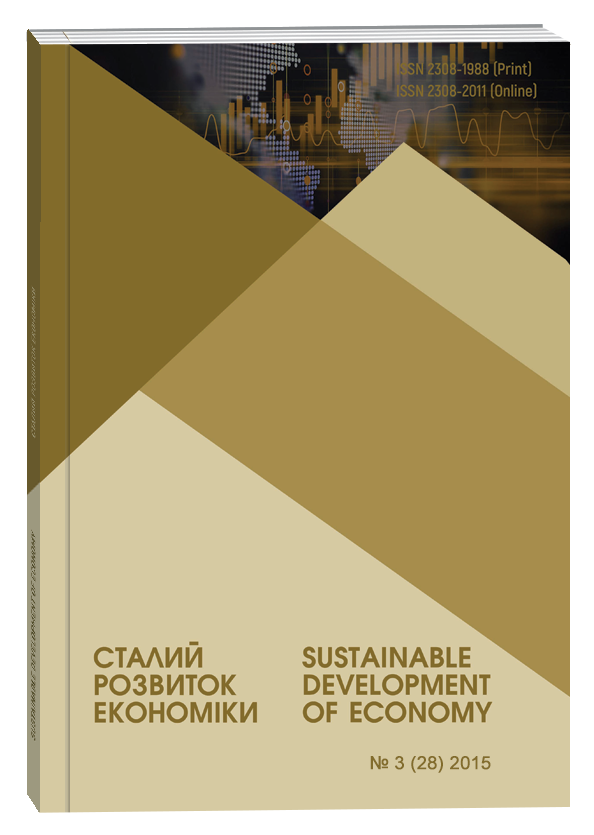THE THEORY OF "FREE MONEY" BY S.GESELL AND ITS EVOLUTION IN MODERN ECONOMIC SCIENCE
Abstract
Purpose. The article aims to identify the feasibility and effectiveness of the theory of "free money" S.Gesell, using scientific and empirical (experimental) experience of its application. Methodology of research. The methodical base of the research are: a historical method (in the study of the formation and development of the theory of «free money», proposed by S.Gesell and in determining its evolution in modern economic science); empirical method (in detection of experiments about using scientific theory in practice), the method of induction (in the study of empirical data and in the reasoning of conclusions on macro-, microeconomic and social results of the local currency): method generalizations and classifications (in classification of the local currencies): comparison method (in the study of modern features of the local currencies) and other methods of economic research. Findings. Author deduces the evolution and analyzes the main ideas of the economic theories that justify the feasibility of the using of local currencies in business practice. There is the scientific biography of the German-Argentine economist S.Gesell. Also author reveals historical, scientific and economic prerequisites for the formation of his theory of «free money». There is analyzed world experience of implementing the theory of «free money» as an alternative way to overcome the crisis. Experiments in the article allow to describe the current understanding of the theory of «free money» S.Gesell and to establish the impossibility of its using in Ukraine due to the economic crisis. Author reveals that complementary local currencies will able to become the one of the protective, stabilizing instruments to support the local economy and stimulate the development of the social sphere. There is established that the introduction of the local currencies’ systems never accompanied by separatist movements or moods, and vice versa – contributed the formation of strong horizontal links within the local community of people, who live and work within a specific territory. Originality. Author reveals that the ambiguous assessment of the causes and particularly the economic effects of implementing of such currencies make the topic especially relevant. There are described the features of functioning of payment systems based on the use of local currencies and the functions, whose analysis will help to resolve issues like – whether it is useful the implementation of regional currencies in the Ukrainian economy. Practical value. Received results of research help to identify the effectiveness and usefulness of the theory of «free money» S.Gesell. They are able to be used for substantiate financial strategy development.
References
Blanc J. Silvio Gesell's Theory and Accelerated Money Experiments [Text] / J.Blanc // American Journal of Economics and Sociology. – October, 1998. – no. 57(8). – pp. 469-483.
CHIEMGAUER: Startseite [Electronic resource]. – Mode of access: http://www.chiemgauer.info/
Collom, Ed. Community Currency in the United States: The Social Environments in Which it Emerges and Survives [Text] // Environment and Planning A. – 2005. – Volume 37 (9). – pp. 1565-1587.
Dillard D. Keynes and Proudhon [Text] / D.Dillard // The Journal of Economic History. – May, 1942. – No. 2, Vol. 2. – pp. 63-67.
Gesell S. Natural Economic Order. Hidden mysteries [Text] / Gesell S. – Berlin (Germany): T G S, 2007. – 504 p.
Kennedy M. Interest and Inflation Free Money: Creating an Exchange Medium That Works for Everybody and Protects the Earth [Text] / M. Kennedy. – Okemos, MI (USA): Seva International, 1995. – 143 p.
Lietaer B. The Future of Money: Creating New Wealth, Work and a Wiser World [Text]. – London: Random House, January 2001. – 382 р.
Rösl G. Regional currencies in Germany – local competition for the Euro [Electronic resource] / G. Rösl // Discusion Paper Series 1: Economic Studies. – Deutsche Bundesbank. – 2006. – No.43. – Mode of access: http://www.bundesbank.de
The cost behind the moniker: local currencies in Germany Frankfurt am Main [Electronic resource] // Deutsche Bundesbank. – 26.06.2013. – Mode of access: http://www.bundesbank.de/Redaktion/EN/Topics/2013/2013_06_26_the_cost_behind_the_moniker_local_cu rrencies_in_germany.html
Жамс Э. История экономической мысли ХХ века [Текст] / Э. Жамс. – Москва: Издательство иностранной литературы, 1959. – 574 с.
Кейнс Дж.М. Общая теория занятости, процента и денег [Текст]. – М.: Гелиос АРВ, 2002. – 352 с.
Купе Т. Локальные деньги появляются в основном в развитых странах [Электронный ресурс] / Т. Купе // Портал новостей LB.ua. – Режим доступа: http://economics.lb.ua/business/2012/10/02/172846_razvitie_strani_segod nya_ohotnee.html
Луцишин З. Асиметрія та парадокс фінансової глобалізації [Текст] / З. Луцишин // Міжнародна економічна політика. – 2008. – № 1-2 (8–9). – С. 88-121.
Blanc, J. (1998), “Silvio Gesell's Theory and Accelerated Money Experiments”, American Journal of Economics and Sociology, no. 57(8), pp. 469-483.
„CHIEMGAUER: Startseite”, available at: http://chiemgauer.info/
Collom, Ed. (2005), “Community Currency in the United States: The Social Environments in Which it Emerges and Survives”, Environment and Planning A, Volume 37 (9), pp. 1565-1587.
Dillard, D. (1942), “Keynes and Proudhon”, The Journal of Economic History, no.2, Vol.2, pp. 63-67.
Gesell, S. (2007), “Natural Economic Order. Hidden mysteries”, T G S, Berlin, Germany, 504 p.
Kennedy, M. (1995), “Interest and Inflation Free Money: Creating an Exchange Medium That Works for Everybody and Protects the Earth”, Seva International, Okemos, MI, USA, 143 p.
Lietaer, B. (2001), “The Future of Money: Creating New Wealth, Work and a Wiser World”, Random House, London, UK, 382 р.
Rösl, G. (2006), “Regional currencies in Germany – local competition for the Euro”, Discusion Paper Series 1: Economic Studies, No.43, available at: http://bundesbank.de
Deutsche Bundesbank (2013), ‘The cost behind the moniker: local currencies in Germany Frankfurt am Main”, available at: http://bundesbank.de/Redaktion/EN/Topics/2013_06_26_the_cost_ behind_the_moniker_local_currencies_in_germany.html
James. E. (1959), Istoriia ekonomicheskoi mysli XX veka [The history of the economics thought in 20 century], Izdatelstvo inostrannoi literatury, Moscow, USSR, 574 p.
Kaynes J.M. (2002) Obshchaia teoriia zaniatosti, procenta i deneg [The General Theory of Employment, Interest and Money], Gelios ARV, Moscow, Russian Federation, 352 p.
Coupe, T. (2012), “In general local money appears in developed countries”, available at: http://economics.lb.ua/business/2012/10/02/172846_razvitie_strani_segodnya_ohotnee.html
Lutzyshyn, Z. (2008), “Asymmetry and paradox of financial globalization”, Mizhnarodna ekonomichna polityka, no.1-2 (8–9), pp. 88-121.


